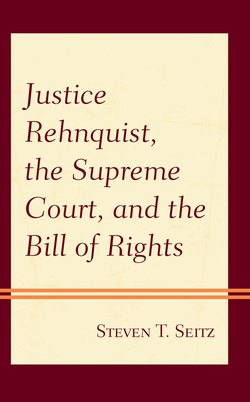Читать книгу Justice Rehnquist, the Supreme Court, and the Bill of Rights - Steven T. Seitz - Страница 38
На сайте Литреса книга снята с продажи.
Unrepentant
ОглавлениеTaney was as unrepentant in Kentucky v. Dennison, 65 U.S. 66 (1861) as he was in Scott but tinged with a bit more political realism. The Constitution of 1789 required the return of runaway slaves and that provision got statutory instantiation in the Fugitive Slave Act of 1793. In Dennison, the target was not the slave but the paramour who enticed her to escape. Kentucky law adjudged Dennison guilty in abstentia and the Kentucky governor petitioned that the Ohio governor deliver Dennison to Kentucky authorities for punishment. Taney found himself impaled on the horns of a dilemma. Either the Union government had the penetrative power to require one state to enforce the legal decisions of another, or the obligation reduced to comity. No comparable fugitive slave-type power existed. The colonial arrangements had not survived the various transitions through the Constitution of 1787. If Taney issued a writ of mandamus forcing the Ohio governor to comply with the Kentucky governor’s demand, he risked Union enforcement of the privileges and immunities and full faith and credit clauses of the Constitution. Alternatively, the governor of one state could refuse comity for the request of a fellow governor. Taney went with the latter, and he refused the writ of mandamus.
Even the Taney Court recognized the limits of state sovereignty when not focusing on race. During the Civil War SCOTUS illustrated one of the state sovereignty problems in Baldwin v. Hale, 68 U.S. 1 Wall. 223 223 (1863). The instant case focused on a note obligating a citizen of Massachusetts to a citizen of Vermont. The defendant, a Massachusetts citizen, got a certificate of insolvency from that state, and the question was whether that insolvency applied to the note owed to the plaintiff. The Massachusetts Supreme Court held that the insolvency did apply, because the note originated in and was payable in Massachusetts. SCOTUS accepted the facts but disagreed on the law. Because Congress had not exercised its Constitutional power over bankruptcies, the states were free to act. Their decisions, however, were bounded by the borders of their respective states. A state insolvency certificate cannot defeat a diversity suit between citizens. The same insolvency cannot defeat a note made in one state and payable in another. The state’s power over bankruptcy covered only cases between citizens of the same state on a loan made and payable in that state. State-authored bankruptcy cannot violate the contracts clause.
